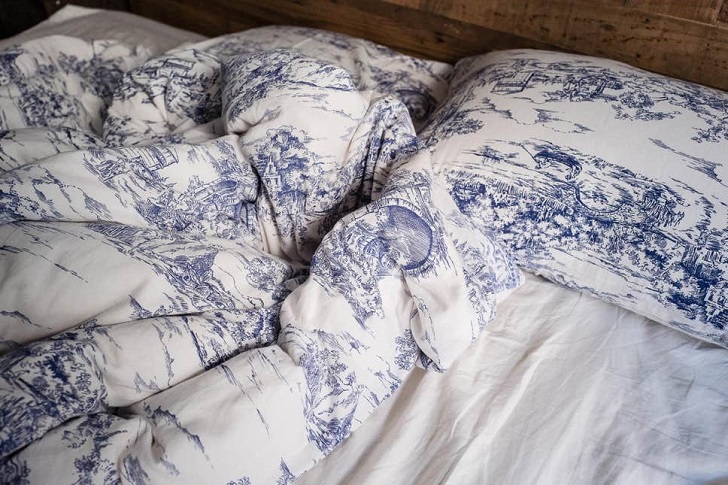
Something in His Bed Was Making Him Sick, What the Doctors Found Was Absolutely Horrifying

New bedding automatically translates to a revamped beauty sleep experience, right? Not always though, according to a recently published case report that’s quite the interesting read.

New bedding does not always translate to a revamped sleeping experience
At the heart of it is a 43-year-old man who fell sick soon after getting himself a new feather duvet and similar pillows.
As you would expect, the man sought medical help, his symptoms being fatigue and that he was feeling breathless. His doctor diagnosed this as an RTI (respiratory tract infection) and prescribed some drugs.
Correct Diagnosis? Not a Chance
Both the patient and the doctor must have thought that an RTI was the right diagnosis, especially because the man’s condition improved soon after the doctor’s visit.
Unfortunately, he was back four weeks later, this time in worse shape. So sick was he that the doctor recommended a 2-week sick leave. The man was constantly breathless while in his house, a situation that perplexed his doctor.
Various blood tests revealed nothing, and the patient’s chest X-ray was normal. Identifying no pathogen that could be affecting his patient, the doctor sought help from a fellow professional.
Together with the specialist, the doctor went through the patient’s lifestyle, analyzing every little detail. The man didn’t smoke, his shower had some mold, he owned both a cat and a dog as pets, and he had recently bought feather bedding.
Armed with these facts, the specialist ordered some additional bloodwork and this time around, they hit the jackpot. Apparently, this patient had had some exposure to avian protein, a protein that is only present in birds. How so, yet he didn’t own a single bird?

Avian protein is only present in bird feathers that are used in beddings
It was then that it hit these medical professionals, making the connection between their patient’s symptoms and his newly acquired bedding. From then on, reaching the correct diagnosis was only a step away.
Upon further investigation, the doctors found out that the man’s lungs were quite inflamed, a finding that aided in reaching the hypersensitivity pneumonitis diagnosis. Being the blanket name for conditions that cause lung inflammation after exposure to an allergen, the medics still had to narrow down on the specific disease that was affecting their patient.
They both agreed on “feather duvet lung,” a bird allergy triggered by inhaling dust from feather bedding. The higher the exposure to such dust, the worse the condition gets, and it presents with fever, a dry cough, and weight loss.

Dust from feather bedding triggers feather duvet lung, a deadly allergic reaction
A Rare Disease
And while this case report urges doctors to be on the lookout for such cases especially during winter, Dr. Purvi Parikh, an immunologist, says that hypersensitivity pneumonitis happens to be a very rare disease.
2 in 100,000 people fits the definition of rare, don’t you agree? However, because it’s rare doesn’t mean that it should be ignored. Dr. Parikh insists that if left untreated, the allergy can have far-reaching consequences.
She also says that when it comes to allergies, you never know you’ve got one till you are exposed to the allergen. For most people, coughing and breathlessness tend to be the only symptoms they associate with an allergy, a fact that we’ve got wrong, according to the doctor.
Dizziness should also be a telling sign, and you should visit your doctor if it just won’t go away. Dr. Parikh also says that if you suffer from allergies, it’s best to stay away from feather bedding, just as a precaution.
More in Medical Conditions
-
Endometriosis in Teens: A Guide to Understanding and Supporting Adolescents
Endometriosis, a condition often associated with adulthood, can make an unwelcome entrance during adolescence. For teenagers grappling with the complexities of...
January 23, 2024 -
Has Childhood Trauma Haunted You into Adulthood? Here’s How You Can Defeat the Past
Even without being particularly too keen about it, you must have noticed that the conversation around childhood trauma has been gaining...
January 10, 2024 -
Storing These Food Items in Your Fridge May Actually Be Bad For You
People have a tendency to just stash a lot of things inside their refrigerators. Oftentimes, you don’t even remember what’s inside...
January 10, 2024 -
How to Deal With Holiday Stress
We all feel stressed from time to time, but the holidays offer their own special stressors that can make us feel...
December 21, 2023 -
Tips to Develop a More Focused Mind
Do you ever feel you’re always busy and the days are progressively getting shorter? Are you constantly stressed out and unable...
December 21, 2023 -
How To Develop A Healthy Relationship With Weight
Most of us have a complicated relationship with weight and spend most of our days on the scale, letting our minds...
December 21, 2023 -
Advantages of Offering Health and Wellness Benefits to Employees
Employers frequently struggle to provide the benefits that their employees desire, such as health insurance or paid overtime. Changes to federal...
December 21, 2023 -
Can Acupuncture Help Prevent Type 2 Diabetes?
In today’s world, health conditions like cardiovascular diseases, hypertension, and diabetes are becoming more and more common. It is extremely important...
December 4, 2023 -
Did You Know There’s A Tiny Farm In A Berlin Supermarket?
When you go to a grocery store, you head over to the fresh foods aisle where you pick up things like...
December 4, 2023















You must be logged in to post a comment Login